Roster and Financial Breakdown:
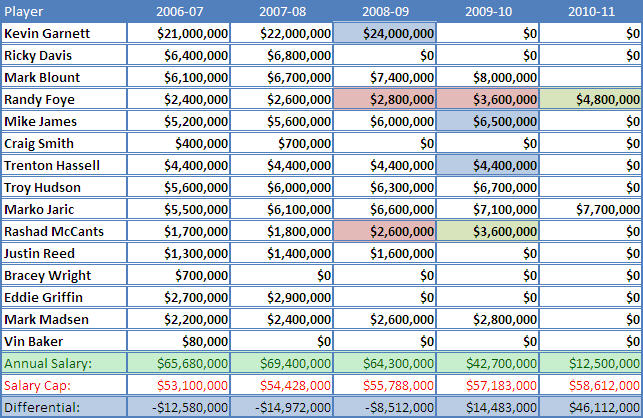 [c]salary cap figures generated by taking the average rate of increase over the past 5 seasons[/c]
[c]salary cap figures generated by taking the average rate of increase over the past 5 seasons[/c]Efficiency
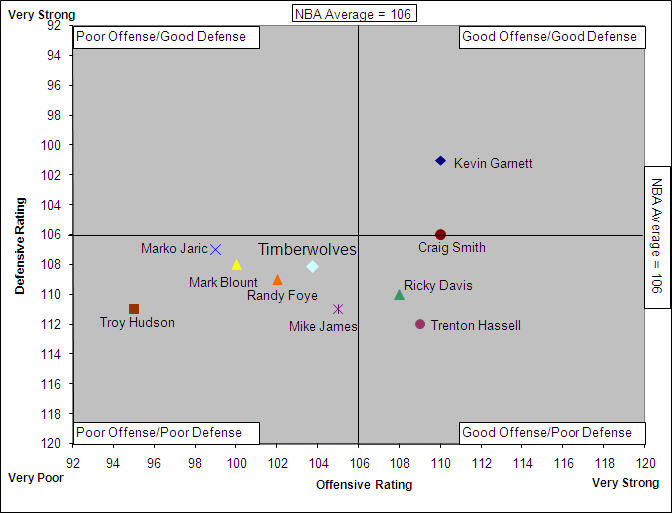 [c]courtesy of Paul Gearan and Heather Allen[/c]
[c]courtesy of Paul Gearan and Heather Allen[/c]Usage
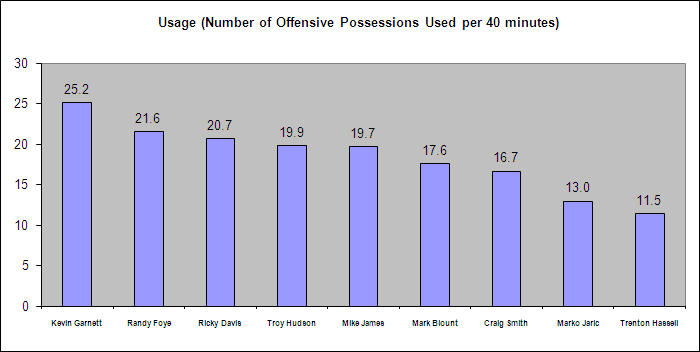 [c]courtesy of Paul Gearan and Heather Allen[/c]
[c]courtesy of Paul Gearan and Heather Allen[/c]Record/ Overview:
32-50, 4th place Northwest Division
The Timberwolves struggled all season to put points on the board, and Kevin McHales decision to sever ties with Head Coach Dwayne Casey mid-season only compounded problems. Interim Head Coach Randy Wittman took over for the 20-20 Casey and posted a meager 12-30 record after McHale decided to act on the perceived lack of progress the team was making. This breach in continuity really hurt any chances Minnesota had of making it to the playoffs this season, and put a lot of pressure on players to adjust to Wittmans coaching style.
The Timberwolves need to hire a Head Coach this offseason that has legitimate winning experience, so that they can bring some long-term continuity to one of the most important positions in the franchise. Minnesota will roll out almost the exact same roster next season, so they will need to create some internal stability if they want to even make a run at the playoffs next season.
Current Assets:
What really hurts Minnesota is their lack of quality niche players. With Mike James, Troy Hudson, and Marko Jaric running the point, the teams offense doesnt have the type of dynamic playmaker that makes good decisions and sets up his teammates. On a team with Kevin Garnett and a handful of quality swingmen, such a player would make an instant impact. The Timberwolves have a handful of players that they could deal in order to obtain such a playmaker, but arent in position to leverage such a player without dismantling their current core.
The Timberwolves will have one major asset this offseason, and that is the contract of Ricky Davis which expires at the end of next season. Davis is playing at a bargain for such a talented player, but his attitude may deter some teams from looking at him as a viable option. Outside of Davis, the Timberwolves have most of the players they would really like to deal locked up for too long to make them attractive to any other team.
The positive thing that the Timberwolves do have going for them is the quality of the young talent on their roster. Randy Foye played well as a rookie, and could break out next season. Rashad McCants played well coming off of a devastating injury, and could surprise a lot of people if he works hard in the offseason. Both young swingmen have the potential to develop into starters, which may make Kevin McHale hesitant to deal them for short-term success. Post players Craig Smith and Justin Reed could also be valuable bargaining chips, but wouldnt be enough to make a team consider taking one of Minnesotas bad contracts of their hands.
Expiring Contracts-
The Timberwolves dont have any players currently on their roster with expiring contracts outside of Bracey Wrights small deal. However, they will find some small relief from the expiration of the deal of Vin Baker, which wont come close to pulling the Timberwolves back under the salary cap.
Total Cost: $742,765
Rotation Players-
The Timberwolves would probably like to part ways with at least half of their rotation. In the backcourt, Marko Jaric, Mike James, and Troy Hudson have all failed to live up to expectations. After signing a big free agent deal last summer, James averaged less than half as many points per game than he averaged last season. His current deal lasts through 2009 with a player option for the season ending in 2010. Hudsons and Jarics situations are almost identical to Jamess. Jarics numbers have declined since he jumped ship from the Clippers two seasons ago, and he wont come off of the books until 2011. Hudson has seen injuries slow him down since resigning with Minnesota, but his decline in production has been significant as well. Coupling Hudsons deal, which expires in 2010, with those of Jaric and James, the Timberwolves have invested nearl $18M in a backcourt that simply doesnt get the job done. Dont expect more than one, if any of these three, to be back after the expiration of their deals.
On the perimeter, Minnesota features a pair of talented players in Trenton Hassell and Ricky Davis. While Hassells offensive numbers have declined, his abilities on defense havent. When he was signed to his current deal, which lasts until 2009 with a team option for 2010, Kevin McHale wasnt retaining Hassell for his ability to put the ball in the basket. Hassell has the ability to put points on the board when he is playing with a quality facilitator, but his true value is in his ability to provide a complementary defensive presence to Kevin Garnett. Davis is in almost the exact opposite situation. His offensive game is so important to Minnesota statistically that it would look rather odd on paper if they decided to trade him. Minnesota will likely try to trade Davis and Hassell this offseason, in hopes that they can acquire a good pass first point guard along with a small forward or a backup center.
In the post, the Timberwolves rotate a trio of players, including franchise player Kevin Garnett. Mark Blount, who came over in the Wally Szczerbiak deal last season, has finally hit his stride after having a bit of a tough time adjusting to playing next to Garnett. His rebounding numbers for a player his height leave something to be desired, but he is still an efficient player. He may not be giving Minnesota their moneys worth, but very few centers in the NBA are anymore. Blount is a solid player, who will provide complementary post play until his contract expires in 2010. Similarly, Mark Madsen will be around until 2010, but is more of a locker room presence than anything else.
Regardless of what is around him, Kevin Garnett is the identity of the Minnesota Timberwolves. His desire to make it to the playoffs and win a championship has catalyzed at least some of the turnover on Minnesotas roster during the last few seasons. He is clearly dissatisfied by the lack of improvement, and is the only reason this team is a threat to make the playoffs. However, the loyalty that Garnett has to the organization that drafted him seems to run deep. His contract runs through next year, with a player option for the season ending in 2009. If the team doesnt improve significantly next season it is very likely that Garnetts loyalties may run out.
Total Cost: $56,391,000
Prospects
Minnesota has five solid prospects, none of whom have reached their ceiling in term of production. Forwards Justin Reed and Craig Smith are cut from a similar mold physically, but Smiths production in his rookie season eclipses what Reed has done in his entire career. Reed has been solid in limited minutes, but Smith has proven to be one of the most productive rookies in the entire NBA. Smiths contract is an absolute bargain, and he will earn a significant raise when he becomes a restricted free agent at the end of next season.
The Timberwolves also have three quality young guards, with much of their future stock put in former first-round picks Rashad McCants and Randy Foye. The third guard, Bracey Wright, had his option picked up for this season, but was more of an insurance policy after playing extremely well in the NBADL back in 2006, and should be moving on.
McCants and Foye are the keys to Minnesotas short-term success. McCants spent the beginning of this season injured, but began to show signs of development as the season went on. It was clear that McCants wasnt the same player he was at North Carolina, and an offseason of hard work could go a long way towards getting his career back on track. McCants should be retained up to, and after, his restricted free agency in 2009. In comparison, Foye came on extremely strong in the last month of the season when his shot started falling. His average of 15.4 points per game in the month of April is a testament to how far he came as the season went on. He should be Kevin Garnetts sidekick next season, and should be retained when he becomes a restricted free agent in 2010.
Unfortunately, Foye is one of the few players on this team with any trade value, and would likely have to be included in any deal through which Kevin McHale tries to dump the big contracts of his underperforming backcourt. Minnesota would be best served not to trade Foye, as his development could be the key to keeping Kevin Garnett from heading elsewhere.
Total Cost: $5,814,708
Free Agency
Minnesota will be over the cap for the next few seasons if Kevin Garnett doesnt opt out, so they will only have their Mid-Level Exception to work with. They will be active in the trade market, so their targets in free agency will be largely dependant on who they can acquire through that avenue. With very few solid backup centers available in free agency, and rumors purporting that Minnesota will buy one of Phoenixs late first round picks, the Timberwolves will likely target a swingman or point guard in free agency.
There isnt going to be a lot of quality available for Minnesotas asking price, but they do have an interesting bargaining chip in Ricky Davis. They would be well served to make a run at some restricted free agents with their MLE before making a decision on Davis. In the post, Anderson Varejao would be a perfect fit next to KG, but Cleveland may be inclined to keep him and their other potential Minnesota target, Sasha Pavlovic. Golden States Mickael Pietrus would be another interesting option on the perimeter.
It seems like the ideal solution to Minnesotas problems would be to acquire a player through a sign and trade using Ricky Davis and one of the teams prospects as a bargaining chip. Mike Bibby would be great alongside Kevin Garnett, but his price tag will likely be too high if he terminates his contract early. Maurice Williams and Chauncey Billups are other options, but Minnesota would really have to give up a lot to get any of these three players.
This teams strategy in free agency should ultimately come back to what Kevin McHale feels is the current state of his roster. If he sees the potential for growth without making an addition, he probably wont make a trade. However, he could just as easily feel pressed to address the teams holes to please Kevin Garnett. Either way, this will be a critical and interesting summer for the Timberwolves.
Draft
The Timberwolves offseason will really come to a turning point on draft day. The team will have so many options available to them, and making the right one could be the difference between reaching the postseason or falling farther into the lottery. The Timberwolves are seeded 7th in the lottery, so they have no shot at Greg Oden, Kevin Durant, and Brandan Wright, but they will probably wind up having to choose between Corey Brewer, Jeff Green, and Spencer Hawes.
Depending on what happens to Ricky Davis, Brewer and Green could ultimately be the two options. Brewer brings the defense and playmaking component that this team desperately needs, but also has the versatility to help out across the board. Green is a player of similar caliber, but he is more of an inside player than Brewer. Julian Wright is yet another potential option, but he may be too raw offensively for Kevin McHales tastes.
Hawes is an option, but Minnesota would probably be best served to avoid selecting a center with their first pick. Post players notoriously take longer to develop, and the Timberwolves are looking for immediate dividends.
If Minnesota manages to trade Ricky Davis along with either Mike James or Troy Hudson, Mike Conley could also come into play. His play making skills would be a welcomed addition to a team that lacks a distributor. Brewer should be Minnesotas pick if he is available, as he is an instant impact type of player with the potential to be a great all-around forward.
If the Timberwolves decide to buy Phoenixs pick, they would likely do so with the intention of taking a center. Aaron Gray or Marc Gasol could be long-term replacements for Mark Blount and could provide some depth immediately. Javaris Crittenton could be a good fit for Minnesota if he falls, as would Acie Law.
Minnesota will not have their second round selection, but they will have that of the 76ers. Whichever of their three needs has not been addressed by this stage of the draft will likely be their target. Kyle Visser would be a quality player to bring in behind Blount, while Derrick Byars and Taurean Green would serve to fill the teams other needs should that be their priority. Minnesota will need to come up big in the draft if they want to make the playoffs next season, and should look to explore their options with Ricky Davis early in the offseason in order to simplify the draft process.












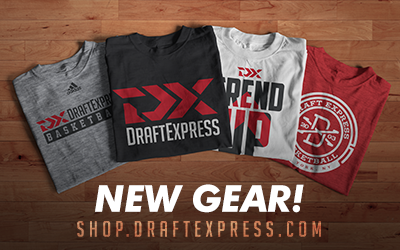

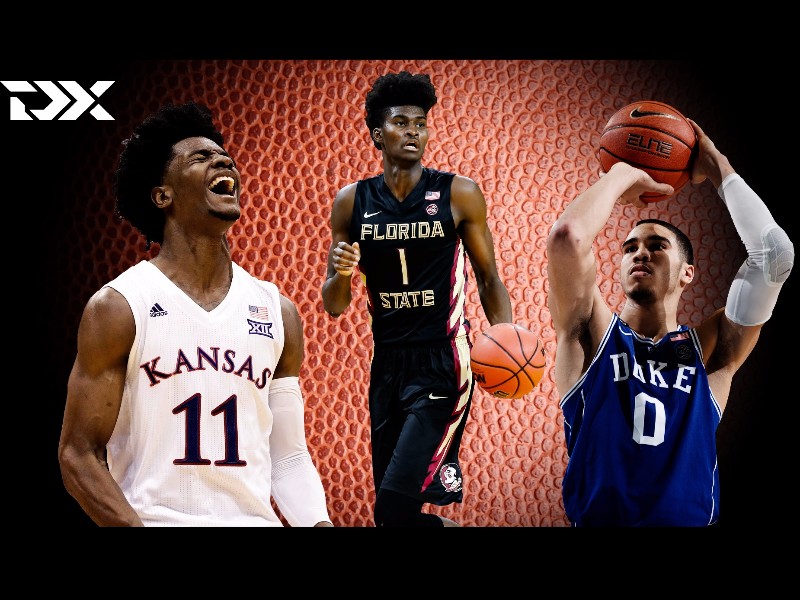
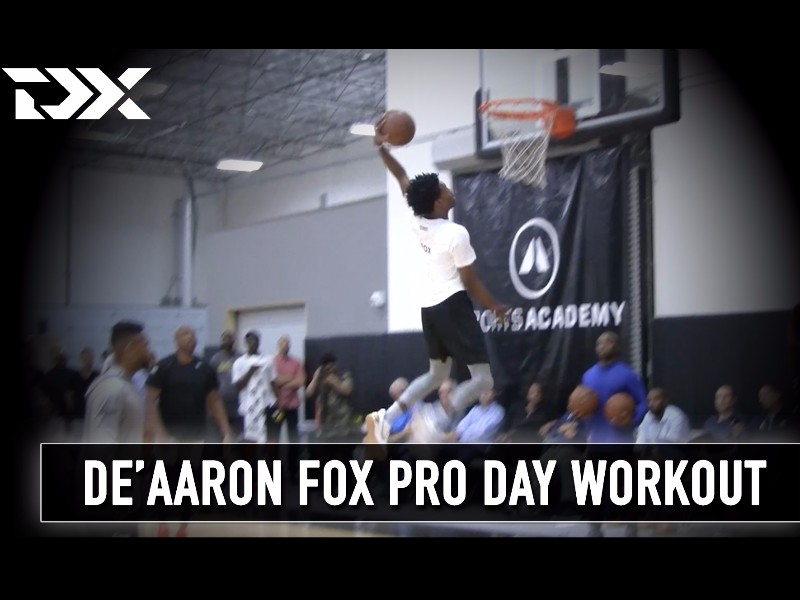




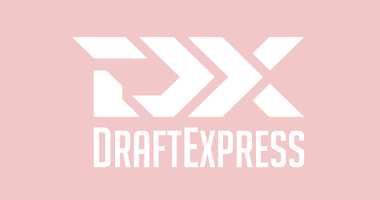



































Comments